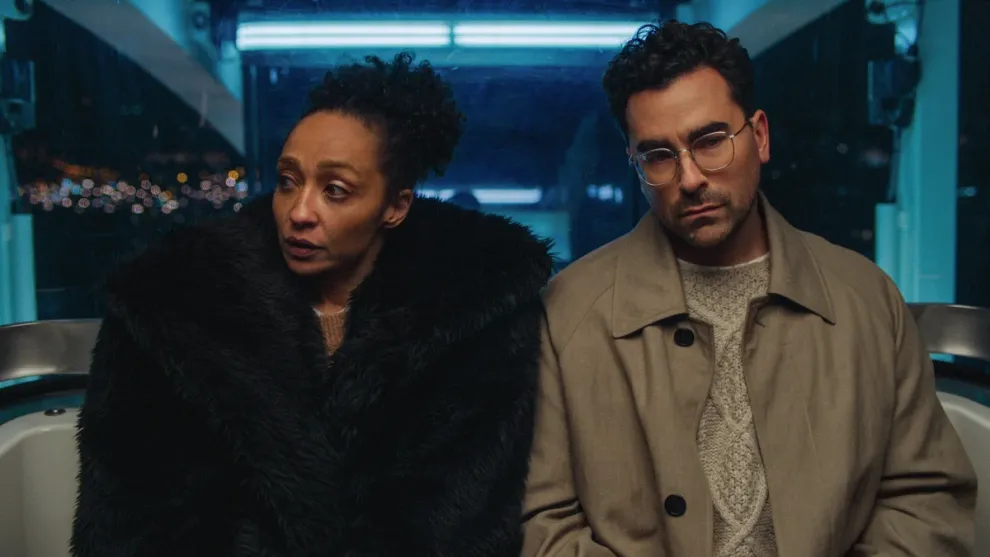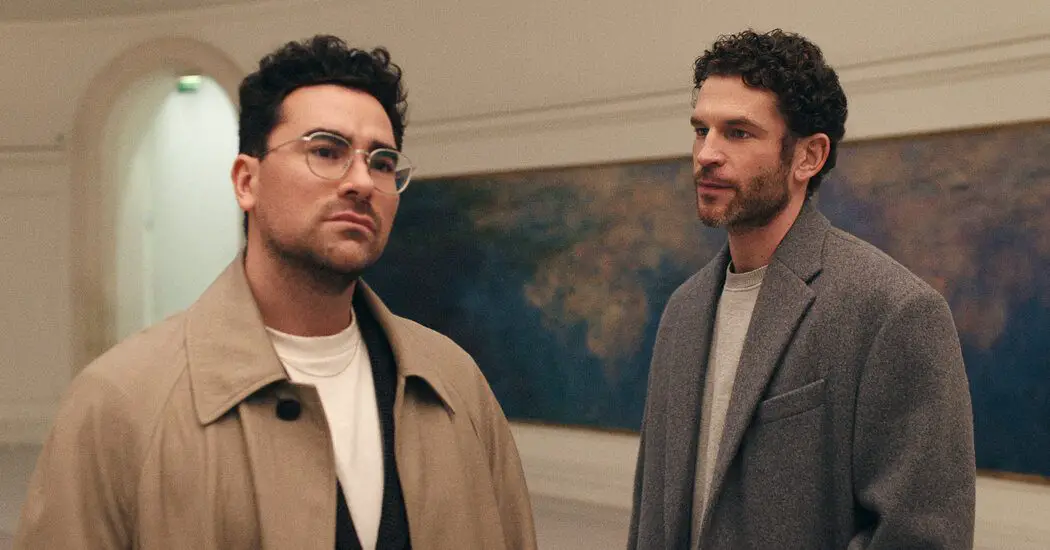Good Grief has a good and charming cast stuck in a movie that is neither. I don’t mind watching movies about rich people, but I do mind watching mediocre ones about boring ones.
Written and directed by Daniel Levy, Good Grief stars himself, Himesh Patel, and Ruth Negga. The film follows Levy’s Marc as he struggles through grief after his partner Oliver (Luke Evans) is killed by a drunk driver. Patel’s Thomas and Negga’s Sophie, his ex-lover and straight best friend, comfort him as he soon discovers that his husband was having an affair.

There’s a certain tone-deafness that hampers Good Grief. The characters are affluent, with Marc as a former painter, Oliver as a famous writer, Thomas as a gallery owner, and Sophie as a costume designer. By itself, dramas with rich characters are not a bad thing. Still, there’s a certain sense of not reading the room when a film attempts to turn an estate agent into a therapist for the main character, even if that estate agent cum therapist is played by the luminescent Celia Imrie. Imrie has maybe three minutes of screentime, and she makes a meal out of every single second.
Add to the pile that the leading trio of friends are, in some form or another, walking trash fires, but in a way that’s neither fun to watch nor engaging. They aren’t damaged so much as spoiled brats with bouts of self-awareness. Yet, it’s not even that they are spoiled brats that’s the problem so much as that they are the most carbon copy spoiled brats.
Good Grief suffers from the strange condition of having good dialogue but a horrible script. Levy knows how to make words sing, and for a movie as forgettable as Good Grief, there are a lot of good lines, such as when Sophie whines, “I want someone to look at me like I’m fresh out of the box.” The dialogue may be good, but the characters are so empty and unimaginative it’s shocking they stumble upon such fantastic wording. Arnaud Valois’s Theo, whom Marc meets in Paris, is a prime example. Handsome, sophisticated, and shockingly uninteresting, I wondered what Marc even saw in him.
There are moments when Levy seems to understand the rarefied world he and his friends inhabit. After he discovers that his husband has been keeping a secret apartment in France where he was having an affair, Marc invites Thomas and Sophie to the Paris apartment to get away from everything. Marc mentions he’s giving up the apartment anyway. Patel’s Thomas responds with the central question that haunted my brain while watching Good Grief. “What does it feel like to casually mention you’re giving up a place in Paris?”
Good Grief feels like Levy traced a Whit Stillman movie. Stillman has made a career of making movies about spoiled privileged brats, but there’s a wit, heart, and visual astuteness to them that is utterly lacking in Levy’s Good Grief. Levy uses Ole Bratt Birkeland’s camera as a recording device and nothing more. The frames are never ugly, but they are so polished and devoid of any imagination or thought of how the image could tell us something about the characters or the world around them that it feels arid.
To put it in perspective, I recently watched Mark Polonia’s Motorboat, which is about the murdered spirit of a Satanic Cult leader who kills people with a phantom motorboat. The movie is fantastic trash, yet it holds more cinematic inspiration and joy despite being derivative of half a dozen films. My point is Motorboat feels alive in a way Good Grief only broaches.
But when Good Grief does broach emotional truth, it soars. Oliver’s funeral is one of these moments. Levy understands that funerals are not for the departed but for the living. He deftly shows how funerals can act as a stage for inane vanity or as a chance for emotional catharsis. Kaitlyn Dever plays Lily Kayne, the star of the movies based on Oliver’s books; she’s recently gotten implants and can’t wait to show them off. She takes Oliver’s funeral and turns it into a pity party about the state of the franchise and her career. It’s one of those moments where you want to turn away, but Dever makes it impossible to do so as she brilliantly plays Lily’s obliviousness to the hilt.
But then David Bradley, Oliver’s father, Duncan, has a monologue. He speaks about Oliver’s first words, how he wrote stories about princesses, and how Duncan told him boys don’t write stories about princesses. Bradley is sensational with this brief moment of screen time as the memories of his own machismo haunt him, smashing into his pride and love for the man his son became in spite of him, playing across his face. The moment brought me to tears. Sadly, Levy never again approaches anything that honest and human for the rest of the movie.
Even here, though, Levy undercuts what’s working best. He and his editor, Jonathan Corn, keep cutting back to Levy for reaction shots. On the surface, this may seem like common sense, but cutting away punctures the ballooning emotion, whether it be anxiety or despair. It dilutes the scene because of Levy’s vanity. Curiously, we don’t see Marc’s speech or anyone else who the movie follows, so the scene stands as a curiosity, the most effective yet the least consequential to the film overall.
The vapidness of Good Grief is only made worse by wasting Negga’s Sophie, the only interesting character, if, for no other reason, she’s the one character that has to work. When she breaks up with her long-time boyfriend, or so she says, she doesn’t have a place to live. Meanwhile, Marc and Thomas can rearrange their life at a moment’s notice with little consequence because money may not buy happiness, but it does buy security, freedom, and a full belly.
At times, Birkeland’s lighting feels off, causing Patel and Negga to be left in the dark. Mark that on your calendar that 2024, it took me five days to watch a new movie that didn’t know how to light non-white actors. It’s bad enough to watch Negga give a lively performance that the film has no interest in showcasing, but seeing her and Patel lit so poorly only makes the banality of the emotions more pronounced.

The film is full of vanity, lacking insight, boldness, or even essential exploration of complexity. Especially when considering that Marc and Oliver were in an open relationship but that Oliver’s affairs broke the rules, and Marc never wanted an open relationship but felt pressured- all of which is dropped in a monologue and never visited or talked about again. What could have been interesting, the polyamory aspects, the complex feelings surrounding a non-traditional, non-heteronormative relationship, is all flattened out.
Good Grief is Dullsville Charlie Brown.
Image courtesy of Netflix
Have strong thoughts about this piece you need to share? Or maybe there’s something else on your mind you’re wanting to talk about with fellow Fandomentals? Head on over to our Community server to join in the conversation!

